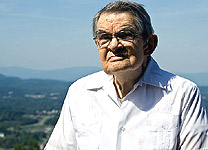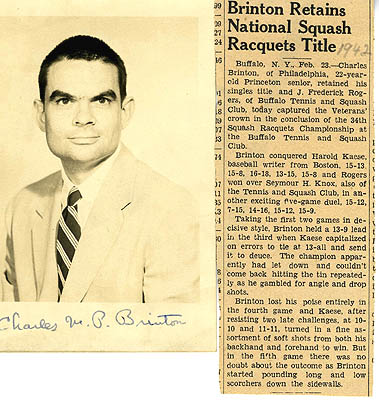CHARLES M. P. BRINTON, 1919-2011, Four-Time National Champion
by Rob Dinerman

Dateline June 14, 2011 --- DailySquashReport.com has learned of the death this past Sunday morning (June 11th) of Charles M. P. Brinton, 91, who won six U. S. National championships (four in singles and two in doubles) during the 1940’s and was literally a first-ballot member of the U. S. Squash Hall Of Fame when that body selected its inaugural class of inductees in 2000. An Honorary Lifetime Member of the Merion Cricket Club, where he first learned the game as an early protégé of that club’s longtime head pro William White, Brinton led a star-studded Princeton roster, which included Stanley Pearson Jr., Hastings Griffin and Cal MacCracken, to Ivy League championships in both 1941 and 1942, in each of which years Brinton won both the Intercollegiate Individual and U. S. National championships. When that latter tournament resumed in 1946 after a three-year World War II-caused hiatus, Brinton successfully defended this prestigious crown in both that year and in 1947 (four straight Nationals wins). He was a two-time Atlantic Coast winner, a four-time Merion Club Champion and the winner of the inaugural Harry Cowles Invitational in 1947.
Brinton also teamed with Don Strachan in 1946 and with his former Tiger teammate Pearson in 1948 to earn the U. S. National Doubles title. Known for his stylish racquet-work, accurate shot-making and exemplary sportsmanship, Brinton also drew effusive praise from the legendary Harvard coach Jack Barnaby for his ability to point his season towards the Nationals and to “peak” at exactly the right time. Complimenting Brinton’s perception and modesty for understanding that he could only play at his top level for a limited period of time, Barnaby admiringly noted that Brinton “looked upon the season as a ramp that led to the top of the mountain – the National Championship. In that event his sharpness of execution and keenness of concentration were beautiful to behold. That this culmination of his abilities always occurred at exactly the right time shows that Brinton really understood himself, not only as to what he could do but also as to what he couldn’t do.”
After spending most of his life in the Philadelphia area, Brinton moved several years ago to Charlottesville, Virginia, where his daughter Natalie, a nurse, could help take care of him. As recently as this past Saturday afternoon, he was avidly watching the NCAA baseball championships, proof that, though he was wheelchair-bound by then, his mind was clear right to the very end. He deserves to be remembered as the top squash player in the decade of the 1940’s and one of the great role models of squash in the United States.

Back To Main
